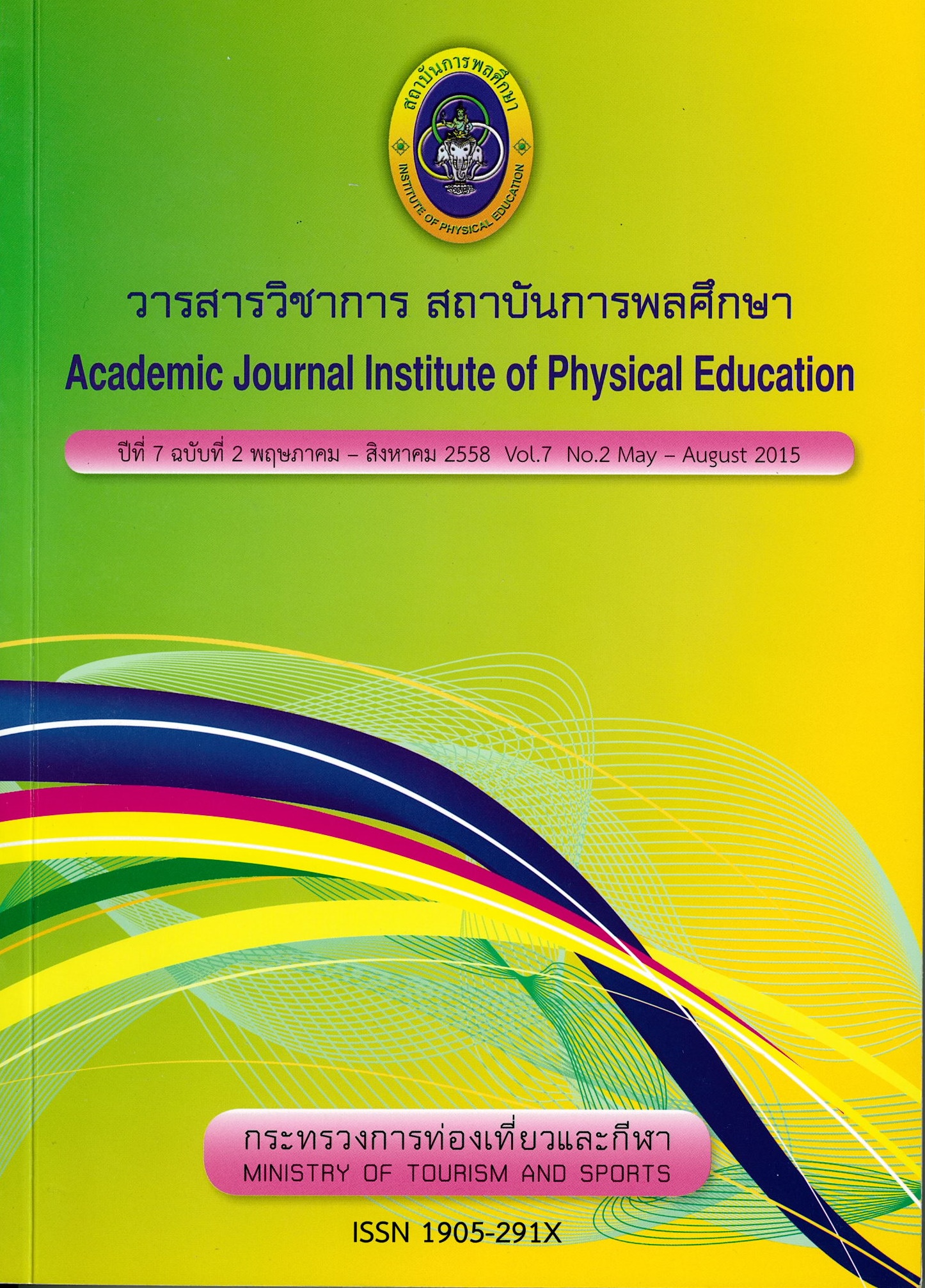Causal Relationship Model of Management Processes Affecting the Effectiveness of Sport Association of Thailand
Main Article Content
Abstract
The purpose of this research was to examine the management processes affecting the effectiveness of sport association of Thailand in order to construct and verify the consistency of causal relationship model of these processes affecting the effectiveness of sport association of Thailand using empirical cata The sample consisted of 479 administrators of sport association of Thailand, stakeholders and Thai national athletes. The research instrument in this study was a questionnaire asking the causal relationship model of management processes affecting the effectiveness of sport association of Thailand. The descriptive analysis was done through software package computer program. The construct validity and model structural relationship were tested by LISREL 8.54
The findings were revealed that causal relationship model of management processes affecting the effectiveness of sport association of Thailand showed congruity with empirical data and accepted. The management processes affecting the effectiveness of sport association of Thailand the most was administrators of sport association of
ling or implementing. This was followed by administrators of sport association of Thailand controlling, organizing, and planning. These could predict the effectiveness of sport association of Thailand by 79.80 percent with statistical significance at .01 levels. Management processes were directly affected the effectiveness of sport association of Thailand were administrators of sport association of Thailand leading or implementing
Also, the result of the study showed that there were three indirect effects of management processes affected the effectiveness of sport association of Thailand. It was found that the planning of administrators of sport association of Thailand indirect affected the effectiveness of sport association of Thailand through organizing, controlling, and leading or implementing of administrators of sport association of Thailand. In addition, it was showed that the organizing of administrators of sport association of Thailand had an indirect effect on the effectiveness of sport association of Thailand through controlling, and leading or implementing of administrators of sport association of Thailand. Finally, the controlling of administrators of sport association of Thailand influenced the effectiveness of sport association of Thailand through leading or implementing of administrators of sport association of Thailand.
Article Details

This work is licensed under a Creative Commons Attribution-NonCommercial-NoDerivatives 4.0 International License.
The published article is a copyright of the Academic Journal of Thailand National Sports University. The passage appeared in each article in this academic journal is a perspective of each author which is not related to the journal. Each author is required to be responsible for all components of his/her own article. If there are any mistakes, each author must be responsible for those mistakes on his/her own.
References
การกีฬาแห่งประเทศไทย. (2536), การศึกษาปัญหาอุปสรรคการพัฒนาศักยภาพของนักกีฬาไทย: ศึกษากรณีศักยภาพของนักกีฬาในการแข่งขันกีฬาโอลิมปิก. กรุงเทพฯ: การกีฬาแห่งประเทศไทย.
การกีฬาแห่งประเทศไทย. (2556). เอกสารประกอบการประชุมคณะกรรมการ กกท. ครั้งที่ 1/2556 วันพุธที่ 30 มกราคม 2556 เรื่อง การจัดสรรเงินอุดหนุนสมาคมกีฬาฯ ที่รับรองโดย กกท. ประจําปีงบประมาณ พ.ศ. 2556. ฝ่ายพัฒนากีฬาเป็นเลิศ การกีฬาแห่งประเทศไทย กรุงเทพฯ.
คณะวิทยาศาสตร์การกีฬา, มหาวิทยาลัยบูรพา. (2551). การประเมินศักยภาพ ความสามารถองค์กรกีฬานักกีฬา และบุคลากรกีฬา, ใน รายงานผลการวิจัยโครงการการจัดแผนและระบบพัฒนากีฬาเป็นเลิศ. ชลบุรี: คณะวิทยาศาสตร์การกีฬา, มหาวิทยาลัยบูรพา.
นภพร ทัศนัยนา. (2536), ปัจจัยคัดสรรที่มีผลต่อความสําเร็จในการแข่งขันกีฬา, วิทยานิพนธ์ครุศาสตรดุษฎีบัณฑิต, ภาควิชาพลศึกษา, บัณฑิตวิทยาลัย, จุฬาลงกรณ์มหาวิทยาลัย.
ภคภูมิ สุขเกษม. (2548), การศึกษาปัจจัยที่ส่งผลสําเร็จของมหาวิทยาลัยที่เข้าร่วมการแข่งขันกีฬามหาวิทยาลัยแห่งประเทศไทย ครั้งที่ 33 พ.ศ.2548. วิทยานิพนธ์ปริญญาครุศาสตรมหาบัณฑิต, บัณฑิตวิทยาลัย, จุฬาลงกรณ์มหาวิทยาลัย.
มนสภรณ์ วิทูรเมธา. (2543). การพัฒนาระบบกัลยาณมิตรเพื่อส่งเสริมการเห็นคุณค่าในตนเองของนักศึกษาพยาบาล. ดุษฎีนิพนธ์ครุศาสตรดุษฎีบัณฑิต, สาขาอุดมศึกษา, บัณฑิตวิทยาลัย, จุฬาลงกรณ์มหาวิทยาลัย.
วรวิทย์ มั่นพันธ์พาณิชย์, สันติพงษ์ ปลั่งสุวรรณ และสมโภชน์ อเนกสุข. (2553). การบริหารจัดการเตรียมทีมฟุตบอลอาชีพ ที่เข้าร่วมการแข่งขันฟุตบอลไทยแลนด์ พรีเมียร์ลีก. วารสาร วิทยาศาสตร์การออกกําลังกายและกีฬา, 7(1), 1 - 17.
สมคิด บางโม. (2553), องค์การและการจัดการ. (พิมพ์ครั้งที่ 5) กรุงเทพฯ: วิทยพัฒน์.
สมชาย ประเสริฐศิริพันธ์. (2548). เราต้องการเห็นประเทศไทยเป็นอย่างไรในด้านการกีฬา, วารสารวิทยาศาสตร์การกีฬาและสุขภาพ สํานักวิชาวิทยาศาสตร์การกีฬา จุฬาลงกรณ์มหาวิทยาลัย, 5(2), หน้า 26-29.
สมาคมปันจักสีลัตแห่งประเทศไทย. (2547). แผนยุทธศาสตร์การพัฒนาสมาคมปันจักสีลัตแห่งประเทศไทย (พ.ศ. 2548-2552). กรุงเทพฯ: การกีฬาแห่งประเทศไทย.
สาคร สุขศรีวงศ์. (2551). การจัดการ: จากมุมมองของนักบริหาร. (พิมพ์ครั้งที่ 4), กรุงเทพฯ : บริษัท จี. พี. ไซเบอร์พรินท์ จํากัด.
เสียงสะท้อนจากซีเกมส์อินโดฯ ความสําเร็จของทัพไทย แต่ยังไม่พัฒนา. (2555), วันที่ค้นข้อมูล 23 มีนาคม 2555, เข้าถึงได้จาก http://www.siamsport.co.th/column/111229 136.html
สํานักวิชาวิทยาศาสตร์การกีฬา จุฬาลงกรณ์มหาวิทยาลัย. (2546). รายงานผลการประเมินแผนพัฒนาการกีฬาแห่งชาติ ฉบับที่ 2 (พ.ศ. 2540-2544). กรุงเทพฯ: จุฬาลงกรณ์มหาวิทยาลัย.
Bateman, Thomas S., & Snell, Scott A. (1999). Management: Building Competitive Advantage (4th ed.). Boston: Irwin McGraw-Hill.
Daprano, C.M. (2001). Perception of organization effectiveness and change in sports association. Dissertation Abstracts International, 61(12), 4726.
Gomez-Majia, L., Balkin, D, & Cardy, R. (2005). Management: People, Performance, Change. New York: McGraw-Hill Companies


